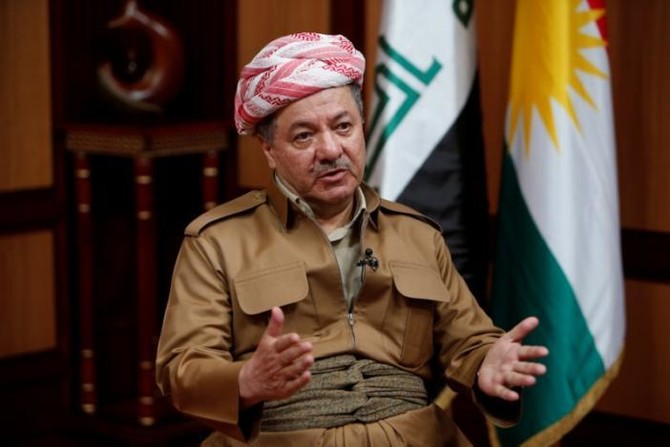ERBIL: Iraq’s Kurdish leader said on Thursday that there was no turning back on a bid to achieve an independent Kurdish state, but he would pursue it through dialogue with Baghdad and regional powers to avoid conflict.
Masoud Barzani, President of the Kurdistan Regional Government (KRG), told Reuters in an interview that the timetable for independence after a Sept. 25 vote on the issue was “flexible but not open-ended.” He expected a “yes vote.”
The vote could turn into another regional flashpoint, with Turkey, Iran and Syria, along with Iraq the states with sizeable Kurdish populations, all resolutely opposed to an independent Kurdistan in northern Iraq. But Barzani played down such fears.
Within Iraq’s borders, there is growing concern the real purpose of the referendum is not secession, but to strengthen Kurdish claims over hotly disputed territory adjoining recognized KRG boundaries, such as the oil-rich region and city of Kirkuk, whose future has been in play for over a decade.
Inside the KRG, parties such as the Patriotic Union of Kurdistan (PUK) of Jalal Talabani or the dissident Gorran group, all favor independence but not necessarily under the leadership of Barzani and his Kurdistan Democratic Party (KDP).
At his palace in the hillside village of Salahaddin, Barzani said the vote would decide the fate of Kirkuk, which Kurdish Peshmerga forces prevented Daesh from capturing in 2014.
“Whatever the people of Kirkuk decide within the referendum, that decision should be respected,” said a relaxed Barzani.
The Peshmerga effectively runs Kirkuk, also claimed by Turkmen and Arabs. Hard-line Iran-backed Iraqi Shiite militias have threatened to expel the Kurds by force from this region and three other disputed areas — Sinjar, Makhmour and Khanaqin.
Barzani, a Kurdish nationalist who has long championed the rights of his people, said negotiations with Baghdad, neighbors and international powers would start immediately after the vote in order to reach an amicable agreement.
“Our main goal is to implement and achieve the decision of our people through peace and dialogue,” he said, wearing his traditional Peshmerga uniform.
HISTORIC BID
Barzani accused the Shiite-led Iraqi government, backed by Iran, of not sticking to a constitutional agreement of allowing the Kurds to have greater powers under a federal state set up after the US-led invasion that toppled Saddam Hussein in 2003.
“For 14 years we have been waiting and we have been discussing this partnership but we have always been told it’s not a good time and it’s not acceptable timing so my question is, when is the right time?“
The Kurds have been seeking an independent state since at least the end of World War One, when colonial powers divided up the Middle East, but their territory ended up split between modern-day Iraq, Syria, Turkey and Iran.
Saddam’s government waged the Anfal campaign against them in the 1980s, killing tens of thousands including with poison gas in the city of Halabja.
Barzani, whose father led struggles against Baghdad in the 1960s and 1970s, grew up in Iranian exile but returned as a teenager, joined the Peshmerga and took on the mantle of resistance. He said the Kurds were ready to take responsibility for the outcome of the referendum.
“We have to rectify the history of mistreatment of our people and those who are saying that independence is not good, our question to them is, if it’s not good for us, why is it good for you?“
Barzani played down speculation that the referendum would spark violence, saying “the legitimacy of the people is bigger than the legitimacy of any of the political parties or any of the external interventions.”
“I don’t think anybody can stand against the big wave of the people of Kurdistan when they decide their destiny. Maybe there will be some attempts to foil (it)... We will try our best not to allow that to happen.”
He said he was ready to allay the security concerns of Iraq, Turkey and Iran, saying that postponing independence would actually lead to greater instability.
“We have proved that we are factors of stability,” he said. “So what we do through a referendum is prevent that upcoming instability. We want to cut any possibility of bloodshed in the future.”
AFTER MOSUL
An additional element of regional volatility is Turkey’s determination to stop further advances across northern Syria by the Kurdish People’s Protection Forces (YPG) militia.
Ankara and the KDP are united in trying to stop the YPG – allied to the Kurdistan Workers Party (PKK) conducting an insurgency in Turkey – from consolidating self-rule in Syria. But Turkey regards Barzani’s independence bid as pulling in the opposite direction.
He said his “Kurdish state” would give full assurances to ethnic minorities including Christians, Yazidis, and Shabaks, indicating his Peshmerga forces had already lost hundreds of fighters to retake their areas from Daesh.
As the battle to recapture the Iraqi city of Mosul draws to a close, Barzani said victory is incomplete without a political reconciliation plan.
He accused the Iraqi government of failing to prepare a post-battle political, security and governance plan.
“I warned if you are not going to have this political plan, the situation will reverse.”
He said a high-level committee formed by the Kurdish region, the Baghdad government and a US-led military coalition to help Mosul leaders rebuild the city had never convened.
“I have big concerns about the situation in Mosul and about post-liberation, because the end of Daesh in Mosul doesn’t mean the end of Daesh. Those factors, the environment that brought it into Mosul have not (changed).”
“I have a big concern about the future of the area. I hope I will be wrong.”



















